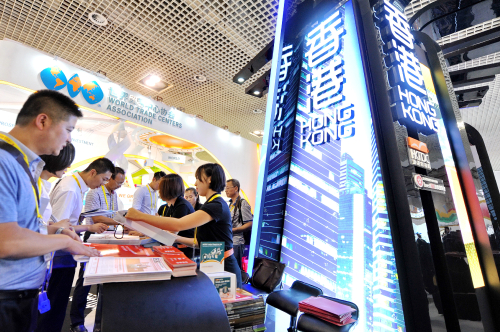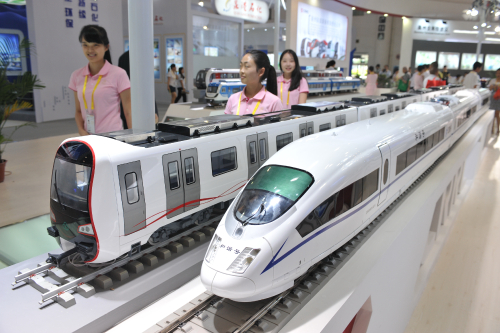|
 |
|
Visitors ask for information on investment at the Hong Kong booth at the 2015 China International Fair for Investment and Trade held in Xiamen, Fujian Province from September 8-11 (XINHUA) |
Jack Ma was the undisputed star of the show at this year's China International Fair for Investment and Trade (CIFIT) held in Xiamen from September 8-11. A Chinese icon of entrepreneurship, Ma has had his hands in a number of enterprises, including online shopping, online financing and several apps dealing with everything from carpooling to laundry.
Though Ma--and China's booming Internet market--has garnered world attention, it's important to remember that small and medium-sized enterprises can't exist online without the manufacturing industry.
"The Internet-based economy cannot prosper without the real economy. Manufacturing is still the linchpin for the Internet age," Dong Mingzhu, President of Gree Electric Appliances, Inc., said at the 2015 CIFIT International Investment Forum.
Producing nearly a quarter of global manufacturing output by value, China is now beefing up its efforts to transform the country's manufacturing industry from one driven by labor to one driven by innovation.
Changing parameters
China's manufacturing sector is undergoing intense change, not only due to contracted exports but also due to the Internet. "The sector used to rely on a large but cheap workforce, but in the future, what really matters will be our brains and imaginations," said Ma. "Big data will inspire such imagination."
With the penetration of the Internet into sales, information, including people's consumption habits, will be obtained through computing more accurately. "Enterprises will have to restructure. Internet data will determine productivity. Much of what's involved in production can be calculated," he said.
As the head of an air conditioner producer, boasting sales around the world, Dong is well aware of the need for information and its importance. "A small company may survive without the Internet, but big businesses performing large-scale manufacturing have to use it to be successful," she said. With the support of the Internet, Dong can substantially trim the maintenance staff but remain an upscale after-sales service.
"By using the Internet, businesses will be able to respond to market changes much sooner, allowing them to optimize production materials, enhance product quality, shorten launch time and increase the market share," noted Wang Xiwen, an expert with the Ministry of Industry and Information Technology (MIIT).
In the meantime, technology advances have led to fewer factory workers. Firms like Gree are using automation and robots to raise productivity. Globally, automation offsets the effects of labor cost increases to some extent. "In developed nations, businesses are using less blue collar workers in manufacturing," said Zhu Xian, Vice President of the New Development Bank operated by BRICS.
 |
|
CRRC Corp. Ltd.’s train models are on display at the 2015 China International Fair for Investment and Trade (XINHUA) |
Tough transition
Upgrading the manufacturing industry is no easy feat--let alone upgrading the system that already exists in one of the economic giants of the world. Take into account rising labor costs and overcapacity, and it's easy to understand why the industry is facing declining profit margins.
In the first seven months of this year, profits made by industrial enterprises above designated sizes--annual principal business revenue of 20 million yuan ($3.1 million)--declined by 1 percent, 0.3 percentage points lower than the period from January to June, according to China's National Bureau of Statistics (NBS).
The manufacturing purchasing managers' index (PMI), the key gauge on factory activity, stood at 49.7, falling below the threshold of 50, in August. A reading above the 50-threshold indicates economic expansion. China's manufacturing PMI figures have fallen close to the 50-mark since last October.
Declining figures mirror the rough waters firms are navigating presently. Dongfang Electric Corp., power generating equipment manufacturing giant in China, is one of them. According to the company's semi-annual financial report in 2015, its net profit stood at 168 million yuan ($26.3 million) in the first half of this year, 79.94 percent down from the same period of last year.
"It is an inevitable consequence of China's economic restructuring. With contracted demands and fiercer competition, firms in the manufacturing sector have to find new ways to bring in cash," said Si Zefu, President of Dongfang Electric Corp. Ltd.
Despite the momentary slump, China still holds formidable advantage in upgrading manufacturing. "China itself is a vast market, and it is already a manufacturing giant. Without exports, many firms are able to survive," said Si.
More and more large manufacturing firms like Dongfang Electric and Gree also emerged in the process of China's economic growth. In 2014, 100 Chinese companies made the Fortune Global 500 list, 68 more than that in 2008, ranking China second in the world in volume of Fortune Global 500 companies--the United States holds the first place. Of the listed companies, 56 fall within the manufacturing sector. Experts noted that these companies will be the driving force for future expansion.
The manufacturing sector will also benefit from the fact more and more workers are entering the job market with diplomas. "Even if wages are high, companies would like to recruit workers with better skills and qualities, as well as high productivity," said Zhu, believing China's improving workforce will foster a bright future.
To innovation and beyond
In investors' eyes, the ultimate success secret for manufacturing businesses is innovation. "Innovative achievements are the ones that stand out," said Zhang Hanya, President of the Investment Association of China.
The manufacturing development plan "Made in China 2025," unveiled this March, set intelligent manufacturing and service-oriented manufacturing as the nation's core projects and priorities.
Regarding the rush to tap into potential in the manufacturing-related services, firms have a lot to do. "After power equipment sales, there are still transactions to be made in installation, maintenance and upgrading. This is a huge market," said Si. He also pointed out that a manufacturing company cannot blindly take charge of all of the services--only those requiring core technologies like equipment upgrading so that the company's competitiveness will not be compromised.
"We need to compete with international advanced technology and improve ours through innovation so that the label Made-in-China can gain the respect of the world," he added.
Against the backdrop of capitals and entrepreneurs enthusiastically diving into the sectors that generate quick money, Si believes manufacturing businesses need to keep cool and learn the skills involved in polishing upscale products.
"Making better and better products based on what a company already has is also innovation," added Zhu.
Copyedited by Kylee McIntyre
Comments to yushujun@bjreview.com | 